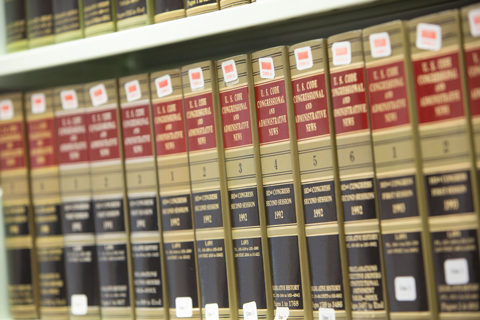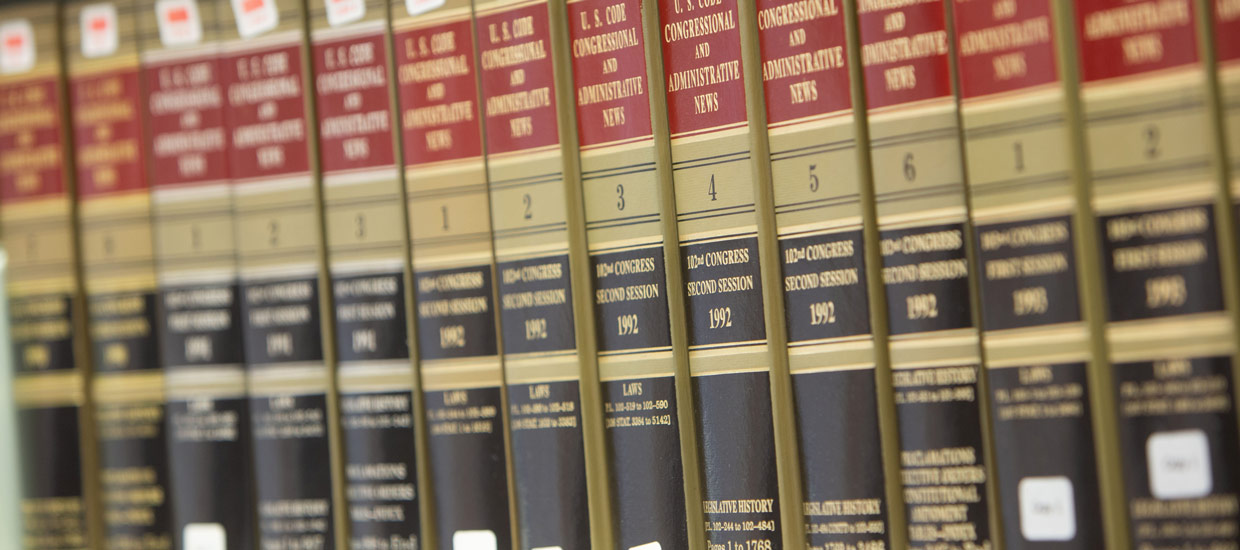- ASK the reference librarians for assistance!
- We sit at the reference desk for the sole purpose of helping you. Please do not wander around the Library or search online unsuccessfully looking for what you need, all the while getting more and more frustrated. Stop by the reference desk and we will help you find the best resource for your project.
- Use the law library's subscription databases.
- The Library subscribes to many helpful databases that may be accessed through the Subscription Databases webpage on the Library's website. These databases may be accessed from the library or by home by logging on to the Law School network.
Below is a summary of a few of the databases:
Hein Online - Hein Online has many major library collections: the Law Journal Library (including older issues of journals), the Federal Register Library (1936-1990), the Treaties and Agreements Library, Code of Federal Regulations, Federal Legislative History Library, and the U.S. Supreme Court Library. All of these libraries are image-based and fully-searchable, meaning that they provide exact page images and enable the researcher to view all pages as they originally appeared in the print version.
Govinfo - Web site for the Government Publishing Office, contains authenticated versions of federal documents, such as the United States Code, Laws, Congressional documents and more.
Congressional (Proquest) - Much, but not all, of this material is on Lexis. It contains federal legislative material, such as laws, congressional bills, reports, and hearings. Congressional includes the U.S. Serial Set Digital Collection 1789-1969. Also included are Congressional Research Service (CRS) Reports and Committee Prints from 2004 to present.
Foreign Law Guide: Current Sources - This resource includes information on major legal publications, such as codes and judicial decisions, as well as where to find specific laws by subject for virtually every country and many regional entities.
Use Richter and Richter's databases to find non-legal materials.
Many of the sources cited in the articles you will be editing will not be strictly legal sources. Therefore, you may need to search the "Everything" tab from the libraries' catalog (uSearch).This tab includes many of the online resources available at UM.
VLex Global is an extensive collection of current foreign law with a focus on Latin America and Europe. Includes legislation, cases, journals, books, news as well as commentary from practicing lawyers in over 100 jurisdictions.
Bloomberg Law - for law review purposes, Bloomberg Law is useful for court documents, particularly for federal courts. If you do not have a Bloomberg Law password, register using your law school email address from the Register Academic Account link.
Don't let the BLUEBOOK drive you crazy!
The following four tips will prevent most (but certainly not all) bluebook frustration:
- Use the index to find what you're looking for!
- Don't try to read the rules. Rather, look for and then copy citation examples instead. Remember that index entries in italics indicate an example citation.
- Use the blue geographic pages to find citation examples for specific jurisdictions (both states and foreign countries).
- Use the "Quick Reference" in the inside front cover for law review footnote example formats. (Note that the inside back cover contains example formats for court document citations, not law review citations).
Let us help you conduct your research for your article or note. We can even help you choose a topic.
If you are having difficulty choosing a topic for an article or note, or if you are having trouble with the research, contact Robin Schard (305-284-6441 or rschard@law.miami.edu). She can set up an appointment for you to meet with her or another librarian who can discuss topic selection or research strategy. As your research continues you can meet again with the same librarian, who will already be aware of your topic and progress.





